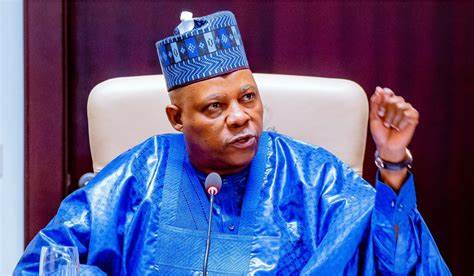The Impact of Reforms by The National Economic Council Chaired by Vice President Kashim Shettima
By Timothy Choji
The National Economic Council a statutory body that meets every month under the Chairmanship of the Nigerian Vice President consists of the Governors of the 36 States, the Governor of the Central Bank of Nigeria, as well as the Ministers of Finance, Budget and Economic Planning, and other stakeholders.
During its monthly meeting, the Council takes a critical look at the economy considers measures that need to be taken to boost the economy, and advises the President on general economic matters.
Under the current administration led by President Bola Ahmed Tinubu, Vice President Kashim Shettima has given the Council the needed leadership.
The Vice President at the first inaugural meeting reminded members of the Council of the task ahead and charged them to focus on issues of governance to ease the burdens of Nigerians that are hanging on the shoulders of especially the council members in various leadership positions.
The National Economic Council took far-reaching decisions that include the setting up of committees on crude oil theft and management, headed by Imo State Governor, Hope Uzodinma; and economic affairs, headed by Kwara State Governor, Abdulrazak Abdulrahman.
The committee on economic affairs was mandated to provide a clear roadmap on how to manage inflation, foreign exchange volatility, and state of emergency on food production.
The committee on oil theft and management is to look at how to curb crude oil theft to ensure that the desired oil revenue is harnessed for the nation’s commonwealth.
In line with the Renewed Hope Agenda of President Tinubu’s administration, the committees draw up short, medium, and long term solutions to address the problems confronting the nation.
The committee on crude oil theft provided an action plan and a roadmap that will help combat crude oil theft headlong as well as block leakages so as to ensure that revenue accruable to the government from the crude oil sector gets into government coffers.
As a way of ensuring food security, the Council met with major fertilizer producers in the country, in order to ensure availability of the major farm input to farmers across the country.
The Council also directed State Governors to embrace modern agricultural methods and considered the establishment of Agro Rangers and State Police, to provide adequate security for farmers to avoid attacks by bandits and terrorists, all in a bid to increase food production and guarantee food security in Nigeria.
As part of its short-term measure, the Council approved the release of 42,000 metric tons of grains from the strategic grains reserve, to address the rising cost of food thus alleviating the plight of many Nigerians.
As the Council works hard to improve the economy to make life better for citizens, some challenges that frustrate this initiative include terrorism, and internal and external conflicts among others.
Another giant step taken by the National Economic Council towards impacting the lives of Nigerians was the endorsement of the $617 million Investment in Digital and Creative Enterprises (iDICE) program to be implemented in the 36 States of the federation and the Federal Capital Territory, Abuja.
This was in support of the Renewed Hope Agenda of President Tinubu’s administration, which promised Nigerians a legacy of prosperity and opportunity for all.
The dice program seeks to pave the way for Nigerian skills and talents for global markets as well as shape the economic landscape of Nigeria for the future.
As the programme blossoms, it’s expected to unlock the potential of the youth in digital innovation, create millions of jobs in the technology space, and enhance economic growth in all parts of the country and beyond.
With these steps being rolled out in phases, no doubt the National Economic Council has good plans for the nation and its citizens, and with the removal of subsidy on petrol, State Governments now have more funds at their disposal to inject in realizing these economic objectives for a safe and secured nation.
The state government should also channel such resources towards the empowerment of the youth and women, who constitute the majority in society. When poverty is tackled, the economy will improve and Nigerians will live better lives and contribute to the nation’s economy for the desired growth and accelerated development.
It’s expected that if these interventions are implemented by the governments and relevant stakeholders, the impact of the National Economic Council will be more pronounced with the multiplier effects improving the economy and development targets attained in Nigeria.

